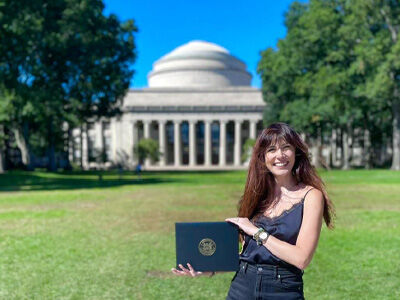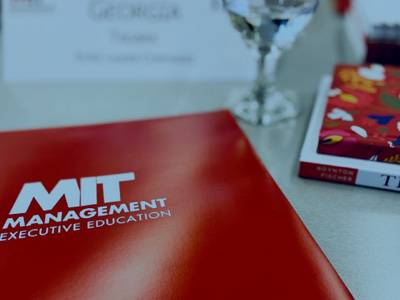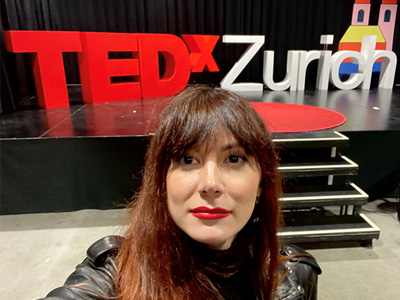Speaking with Georgia Tagara, it’s evident that she’s on a mission to make a positive impact in the world – whether it’s leading global projects at her organization or offering personalized mentorship to younger women entering the workforce in her spare time. One can’t help but be overwhelmed (in a good way) by her genuine enthusiasm and optimism. She strives for meaning and fulfillment in all she does.
As the Sustainable Packaging Procurement Lead for a Fortune 500 Company in the cosmetics industry, she describes her role as “trying to save the planet one bottle at a time.” She’s helping to rethink (and redesign) the sustainability surrounding the many different packages and products we commonly find in our bathrooms – from shampoo bottles to perfume spritzers.
A light at the end of the tunnel
In the fall of 2021, Georgia was dealing with the challenges of the pandemic (like so many of us) and searching for an opportunity that would keep her busy and optimistic. Sustainability had always been a passion point. When she was an engineering student in Greece in 2012, her thesis focused on this topic. However, she hadn’t previously worked directly in the field. After seven years in supply and manufacturing planning, she was ready for a change and was internally promoted to a sustainable packaging procurement role. She quickly began searching for online courses that would help strengthen her knowledge and help her confidently lead projects from her new department.
She discovered Strategies for Sustainable Business and knew this was the opportunity she needed professionally and personally. It almost felt like fate. “Where we are today – there are a lot of things that lead us to this moment. When I was an engineering student in Greece, my dream was to eventually study at MIT. There is not a single engineering student who doesn’t think this – we all want to take that walk around The Great Dome.” Now that MIT Sloan Executive Education had pivoted to live online learning in response to the pandemic, Georgia was able to take the course without leaving the safety of her apartment in Zurich.
The learning journey
“The professors John Sterman, Jason Jay, Bethany Patten, and the other guest lecturers were simply amazing.” During the four-day live online course, Georgia learned more about what drives environmental innovation, social concerns, and the intriguing concept of “unsustainability.” She also had the opportunity to make meaningful connections with her classmates thanks to the various virtual breakout room sessions the course offered.
“After completing Strategies for Sustainable Business, I realized I could continue my education and earn an Executive Certificate in Strategy and Innovation – so it made sense to select more courses.” She enrolled in Corporate Innovation: Strategies for Leveraging Ecosystems, Mastering Negotiation and Influence, and Driving Strategic Innovation.
While she hesitates to pick favorites, she’ll admit that Mastering Negotiation and Influence made a lasting impact. “It was ten amazing weeks of negotiation games, AI algorithms, exploring how your facial expressions can impact the outcome of negotiation with your peers – it was super interesting!” She also enjoyed the self-paced format to help her solidify the learning on a topic she was previously insecure about.
“On a weekly basis I participated in live negotiations with my classmates. When you have 10-15 exercises, you can really learn the theory of the week, apply it live, see the results, and track progress to see areas of improvement. Eleven weeks later, you’re much more confident in what you’re doing and the lessons come to mind a lot more naturally.”
"I’m doing this because I don’t believe we can bring positive change in the world by only driving sustainability and innovation through our 9-to-5 job. It’s what we do beyond that..."

Georgia also gushes about Driving Strategic Innovation. First, it was an opportunity to fulfill her lifelong dream since engineering school and come to the MIT campus. “The school has so much history – you can really feel it. I felt very humbled and honored to be there.” That full-circle moment didn’t stop with just a visit to campus though. Charles Fine – MIT Sloan faculty and author of Clockspeed - teaches in the program and has been an unknowing mentor to Georgia for years. “When I realized that the person who wrote the book on which I based my dissertation in 2014 for my Masters in Global Supply Chain Management was one of the program faculty – I got chills! I even brought my original, yellowed copy to Cambridge with notes in the margins from when I was a student so he could autograph it like a Charles Fine Super Fan! I was so honored to meet one of my intellectual idols in person – and he was just so wonderfully humble!”
Building confidence and credibility
Following her courses, Georgia has continued to implement the varied lessons learned in her day-to-day work. It’s also made her transition into her new role much smoother. “I feel more at ease and knowledgeable.” The terminology and toolkits have also provided additional support in ways she wasn’t expecting. “Sometimes people might call into question your expertise and suggestions. However, when you use state of the art models taught to you by reputable professors, those skeptics will give your ideas more thought. When you use knowledge backed by MIT, it’s easier to not only make the right business decisions, but to legitimize those decisions.”

Lasting connections
Regardless of whether the course format was online or in-person, Georgia was able to connect with a variety of peers around the world with whom she’s still in touch. “A lot of inspiration comes from LinkedIn –my feed is filled with all these amazing stories and professional achievements. I connected with classmates who have been working in sustainability for years, and following their work has been so inspiring. It really motivates you and makes you think about what more you can be doing. What more can I contribute?” She’s also active in a WhatsApp group where classmates from MIT share their journeys and faculty continue to provide feedback and guidance.
After years of pandemic related isolation, a return to a stimulating environment provided an additional emotional salve. “I think everyone was craving this sense of community – particularly a community of the most inspiring professionals out there. Seeing people from vastly different backgrounds from around the world collaborating just makes you feel warm and happy. You really make meaningful connections for life”
Looking forward
Once Georgia earned her Executive Certificate in Strategy and Innovation, she realized she wasn’t done with her learning journey. “After you finish, you’re hooked and want to do more. You find yourself on the website again, scrolling through the courses. And once you’ve earned an Executive Certificate, you have a 20% discount on future courses – so it’s very easy for things to fall into your cart!”
This past October she took Fundamentals of Finance due to the recommendation of a classmate she met during Driving Strategic Innovation. He was in the midst of completing his Advanced Certificate for Executives in Management, Innovation, and Technology (ACE) and listed it as a favorite during his four-year journey.
“Negotiation, influence, entrepreneurship, sustainability – these are all subjects that regardless of your discipline – doctor, engineer, project manager– make sense for everyone to take.
The same way that we don’t just solely read business books on finance if we’re financial professionals.”
For her Strategy and Innovation Executive Certificate, Georgia pragmatically selected courses around her professional responsibilities – sustainability, innovation, strategy. Now, she’s taking some time for herself. In January, she’s returning to campus for the week-long Entrepreneurship Development Program – which will result in her earning an Executive Certificate in Management and Leadership. But it’s not just about earning certificates.
Small actions, big impact
“Entrepreneurship is something I do for me - for Georgia. I’m doing this because I don’t believe we can bring positive change in the world by only driving sustainability and innovation through our 9-to-5 job. It’s what we do beyond that – in our personal time, on the weekends, engaging with others. Over the past few years, I’ve been reading various articles about people who launched innovative businesses, positively impacting the world and society, and I would love to have a positive impact on the planet beyond the confines of my job.”

Georgia walks the talk and has funneled her passions beyond her office walls into varied volunteer work. “Within my company I am a co-chair for Women in Supply Chain, an employee resource group with the mission to empower and enable women in the Supply Chain to reach their highest potential – it now has more than 900 members worldwide.” She also volunteers her time to TEDxZurich which she co-leads while designing audience experiences and managing volunteers. Lastly, she mentors young female professionals in the industry. “I don’t have all the answers for them, but I have made more mistakes than they have in my thirty-six years on this planet – so I can provide advice on what to do and not do. I can help them overcome anxiety around their first jobs and internships and these are super sensitive experiences you go through in your 20s.”
MIT helped Georgia re-focus on the joy in her life after a couple of intense years and she frequently refers to it as her “happy place.” It’s evident that she not only finds personal fulfillment from her educational journey, but in sharing her knowledge with others. Now she wants to focus on new ways to make a positive impact on the community at large. She has a lot of ideas and inspiration to draw from, but the path forward is undefined. She’s taking the Entrepreneurship Development Program to provide clarity, direction, and confidence. “I am excited to come back in January, reconnect with faculty, meet brilliant people, and find a way to take all the creative ideas in my brain and put them onto paper to make them a reality!”
Contributed by Elaine Santoyo Goldman








